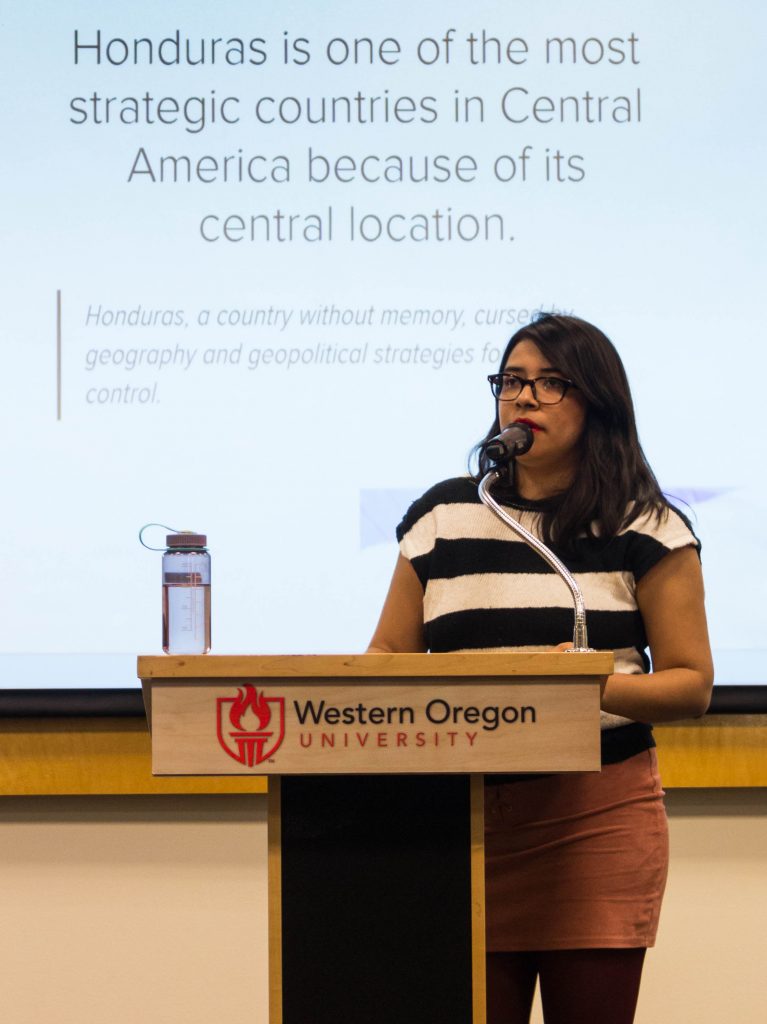
Flora Pugh | Freelancer
Witness for Peace is a “grassroots non-profit organization and our goal is to change unjust U.S. policies and corporate practices towards Latin America,” said Kris Hannigan-Luther, organizer of the group’s northwest region.
On Thursday, Oct. 11, a Latina speaker and Honduran journalist named Jennifer Ávila came and spoke at Western with Witness for Peace. Sponsored by the College of Liberal Arts and Sciences and hosted by the Communication Studies Department and Social Sciences Division, the speech was held at the Werner University Center in the Columbia Room.
Jennifer Ávila shared about the rampant injustice and violence in Honduras that threatens the safety of its citizens. Since 2009, a time when Honduras was considered one of the top ten most dangerous countries in the world, Honduras has become even more dangerous and full of violence.
Ávila also mentioned that the U.S. has helped illegal states remain in control, and since then, Honduras has become more militarized and unjust, with more fraudulent power being put in place. In its current state, Honduras has corruption, no healthcare and practically no education. Most Hondurans only are educated up to the eighth grade, and less than 13 percent of Hondurans end up attending a university. In addition, most of the universities in Honduras are only open to the elite, according to Ávila.
With that being the case, the majority of Hondurans prefer to work because they can’t afford to live and attend school. In fact, more money in Honduras is used to fund the elite, corporations and the military — which the U.S. helps fund — than to fund education and healthcare.
According to Ávila, 90 percent of drug trades pass through Honduras, which has resulted in many being afraid. And a number of people, such as women and children ages 12 to 18, are used as bait for things such as transporting drugs.
However, the LGBTQ community, and particularly trans women, are the most at risk in Honduras. Many trans women end up stuck working in sexual commerce because there is no identification law and very few job opportunities.
In the timeframe between 2009 and 2018, 292 people were murdered in Honduras. Ninety-two of those people were trans women. Ultimately, only 20 percent of the 292 murders were prosecuted.
On a more positive note, Ávila also spoke about how beautiful Honduras is and how we as U.S citizens can help the people in Latin America through voting, advocating and supporting Witness for Peace.
As a Western student, one can raise awareness about the injustice in Honduras as well as vote in favor of local businesses and non-damaging corporation in Latin America. Students can also help by voting on issues surrounding the Honduran people’s basic needs: justice, better education, health, peace and a safer environment to live and raise their children.
When asked what she thought of Ávila’s speech, Anna Cortez, a first-year biology major, commented, “It was really good. I liked the facts and picture and that they showed the good and bad, because it is important to show both.”
For more information on Honduras, Western students can look into Ávila and her friend’s media journal Contra Caliente on the website contracorriente.red. They can also learn more about Witness for Peace on their Facebook page, Witness for Peace Northwest.
Contact the author at fpugh18@wou.edu
Photo courtesy of Ashlynn Norton

